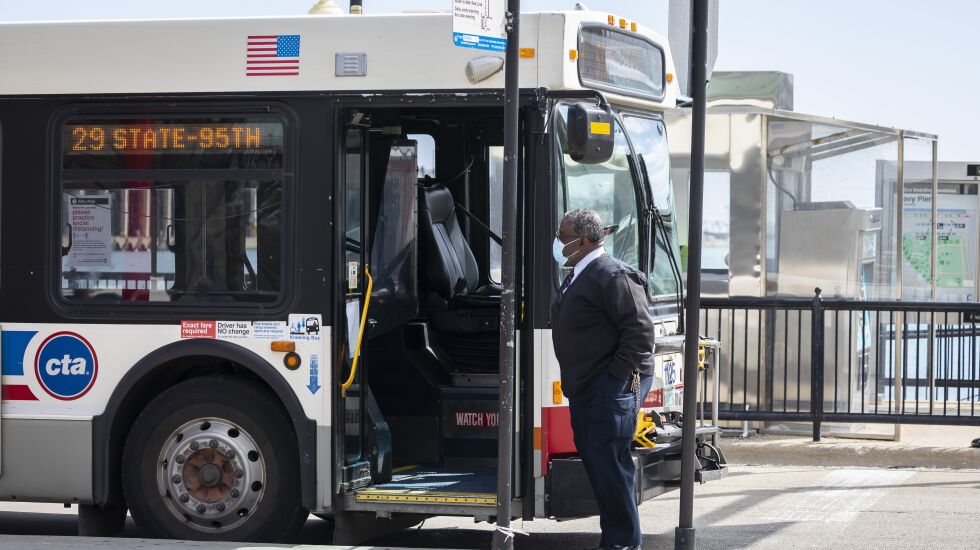
I read Alden Loury’s thoughtful column “Black employment in Cook County sandwiched between hope and reality” in last Sunday’s Sun-Times and was struck by the critical role transit plays in not only creating good-paying jobs but also in providing access to jobs for our region’s residents, particularly residents of color.
According to Nation Equity Atlas, regionally 25% of Black households do not have access to a vehicle compared with 12% of all households. The latest Census data show that 17% of Black workers commute via transit, compared with 10% of all workers in our region.
Reliance on transit is even more important in the city of Chicago at 28% for Black workers compared with 21% overall. The affordability and availability of transit is a racial justice issue for metropolitan Chicago.
SEND LETTERS TO: letters@suntimes.com. To be considered for publication, letters must include your full name, your neighborhood or hometown and a phone number for verification purposes. Letters should be a maximum of approximately 375 words.
The Regional Transportation Authority is focused on improving the affordability of transit by partnering with Cook County and Metra to launch a regionwide reduced fare pilot in 2024 for people with lower incomes who are SNAP recipients.
With increased funding, we are eager to expand this pilot to the CTA and Pace. Today, the state covers only 20% of the cost of our existing reduced fare program, just one data point in the historic underfunding of the system.
An average Chicagoland resident has access to more than 2 million jobs within a 45-minute commute by car, compared to just 135,000 by transit. In our transit-rich urban core, that number improves to 270,000 jobs by transit within 45 minutes, but Black residents have access to 17% fewer jobs compared to all urban core residents.
Moreover, across the region and on all modes, Black and Latinx workers have longer commutes than white workers. One remedy for this disparity is more investment in fast and efficient bus networks through the implementation of the new Better Streets for Buses plan recently released by the CTA and CDOT as well as the continued implementation of more Pace Pulse express bus routes.
Our regional transit system faces a well-publicized fiscal cliff of more than $730 million annually starting in 2026. If we fail to increase public funding for transit, these disparities will grow, worsening racial equity gaps and stifling our economy.
Alternatively, the RTA’s legislative agenda calls for additional sustained funding of $1.5 billion a year, going beyond just covering budget gaps to deliver a system riders deserve.
Transit is not a panacea for all that ails us, but providing adequate funding for transit will give the people who need it most better access to more jobs, education and opportunity. All we require is the political will to see it done.
Kirk Dillard, chairman, RTA
Do we truly believe in free speech?
If college and university administrators had truly defended freedom of speech up until now, the responses of now-former University of Pennsylvania President M. Elizabeth Magill and her colleagues at a recent congressional hearing would not have sounded so disingenuous and opportunistic.
Unfortunately, they have not. The core value of free speech — that ideas, even especially those ideas that we consider repugnant, cannot and should not be censored (but can and should be debated, refuted and even protested when appropriate) — is too seldom recognized as a priority.
The legitimate question of when free expression crosses the line into threats and bullying (e.g., so-called “fighting words”) cannot be debated honestly unless it proceeds from a firm commitment to the value of free speech in the first place.
That this is no longer the case on many campuses seriously compromises our ability to have this important discussion in good faith. Without that good-faith grounding, the entire discussion becomes moot — it simply becomes a matter of who “we” are, who the “other” is and who has the power to silence whom.
David G. Whiteis, Humboldt Park
Security deposit law should cover all Illinois landlords
Regarding the “$40M project highlights pastor’s 25-year effort to bring affordable housing to North Lawndale” Dec. 10 story by Isabel Funk:
As an Illinois tenant, I am very glad and grateful to witness efforts to make housing affordable. Such efforts set the first steps for positive development in a community, which can lead to attracting people to the area for housing and jobs. But to persuade people to continue living there, housing stability must also be met.
One of the major concerns and threats to housing stability is the security deposit. Young people attracted to an area are unlikely to have the money to buy a home and instead will rent, which requires a security deposit — money that could eventually be used to buy a home.
The Illinois Security Deposit Return Act mandates landlords return the deposit in 45 days after a renter has moved out and provide a detailed damage list or receipts for withholding a tenant’s security deposit.
If they break the law, landlords are ordered to return twice the amount of the original deposit. However, this tenant-friendly law only applies to landlords owning five or more units. People are struggling because of landlords’ failure to return security deposits.
One victim of this, Sandra Diaz, had to sue to get her money back, but not everyone has the time and savings to do so. Similar cases of tenants falling victim to security deposit abuses are heard at tenant organizations across Illinois.
Elected officials should pass an amendment to extend the return of security deposits law to all landlords. Such an amendment would advocate for good faith in landlord practices with security deposits and greatly enhance the stability of the rental market.
Eason Lee, Champaign







